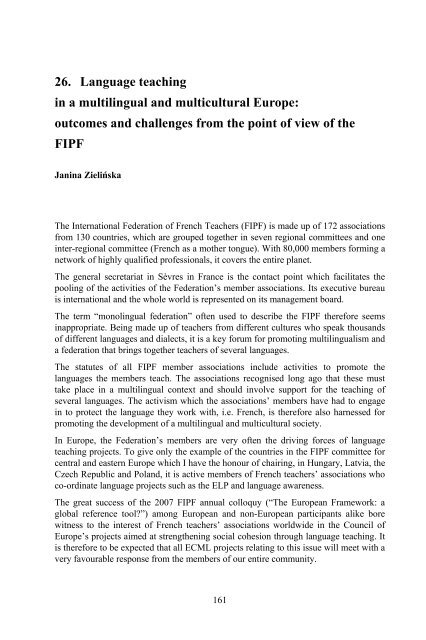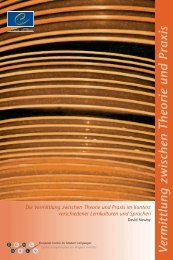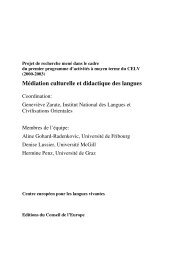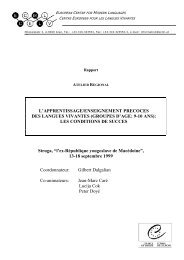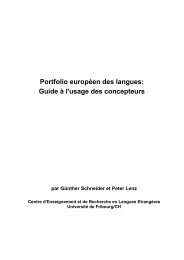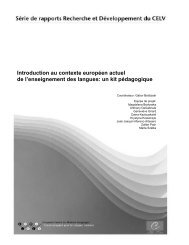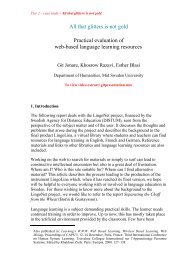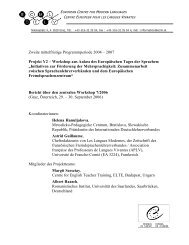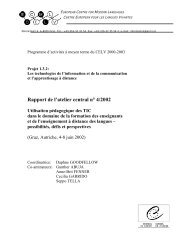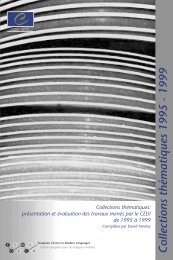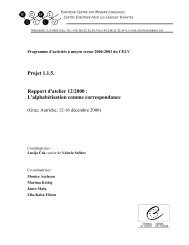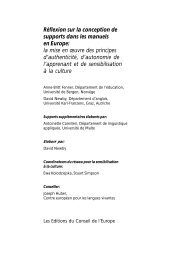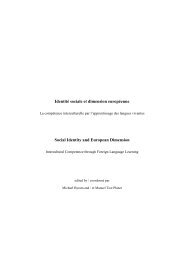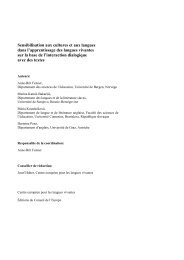cohesion - European Centre for Modern Languages
cohesion - European Centre for Modern Languages
cohesion - European Centre for Modern Languages
You also want an ePaper? Increase the reach of your titles
YUMPU automatically turns print PDFs into web optimized ePapers that Google loves.
26. Language teaching<br />
in a multilingual and multicultural Europe:<br />
outcomes and challenges from the point of view of the<br />
FIPF<br />
Janina Zielińska<br />
The International Federation of French Teachers (FIPF) is made up of 172 associations<br />
from 130 countries, which are grouped together in seven regional committees and one<br />
inter-regional committee (French as a mother tongue). With 80,000 members <strong>for</strong>ming a<br />
network of highly qualified professionals, it covers the entire planet.<br />
The general secretariat in Sèvres in France is the contact point which facilitates the<br />
pooling of the activities of the Federation’s member associations. Its executive bureau<br />
is international and the whole world is represented on its management board.<br />
The term “monolingual federation” often used to describe the FIPF there<strong>for</strong>e seems<br />
inappropriate. Being made up of teachers from different cultures who speak thousands<br />
of different languages and dialects, it is a key <strong>for</strong>um <strong>for</strong> promoting multilingualism and<br />
a federation that brings together teachers of several languages.<br />
The statutes of all FIPF member associations include activities to promote the<br />
languages the members teach. The associations recognised long ago that these must<br />
take place in a multilingual context and should involve support <strong>for</strong> the teaching of<br />
several languages. The activism which the associations’ members have had to engage<br />
in to protect the language they work with, i.e. French, is there<strong>for</strong>e also harnessed <strong>for</strong><br />
promoting the development of a multilingual and multicultural society.<br />
In Europe, the Federation’s members are very often the driving <strong>for</strong>ces of language<br />
teaching projects. To give only the example of the countries in the FIPF committee <strong>for</strong><br />
central and eastern Europe which I have the honour of chairing, in Hungary, Latvia, the<br />
Czech Republic and Poland, it is active members of French teachers’ associations who<br />
co-ordinate language projects such as the ELP and language awareness.<br />
The great success of the 2007 FIPF annual colloquy (“The <strong>European</strong> Framework: a<br />
global reference tool?”) among <strong>European</strong> and non-<strong>European</strong> participants alike bore<br />
witness to the interest of French teachers’ associations worldwide in the Council of<br />
Europe’s projects aimed at strengthening social <strong>cohesion</strong> through language teaching. It<br />
is there<strong>for</strong>e to be expected that all ECML projects relating to this issue will meet with a<br />
very favourable response from the members of our entire community.<br />
161


